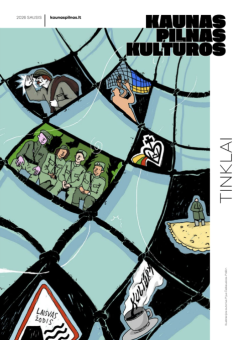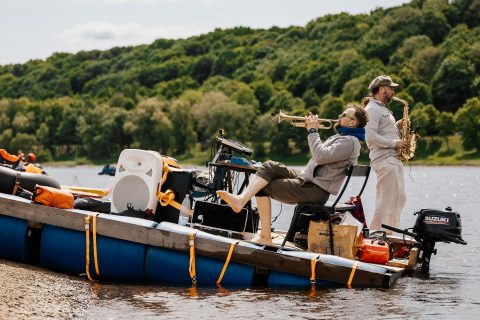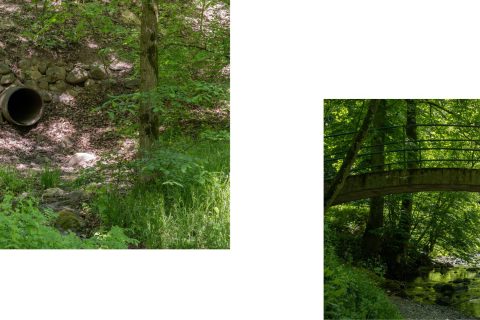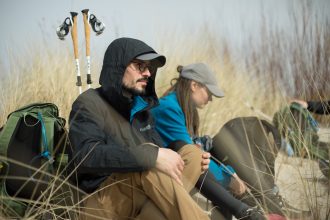“I have always been a dreamer, but even in the deepest trip I could not have imagined that I would become a record holder in sports,” actor, musician, and now free diver Mantas Zemleckas wrote next to an impressive photo depicting the waters of the Philippines that he uploaded on his Instagram on May 3. Us too, Mantas. However, if you think about it for a second, depths, diving, art, and skill sound quite fascinating in one sentence, also, let’s not forget to add the really romantic-sounding term apnea, which means holding your breath. Apnea is also the title of the underwater dance performance and film by choreographer Erika Vizbaraitė, created a few years ago.
The depth has not disappeared. In June, the member of the duet Kamanių šilelis is preparing for a concert at the Audra festival and the start of the AIDA (international APNEA Development Association) world freediving championship. This trip will not take long because the championship will be held right here in Kaunas, in the Žalgirio Arena Swimming Pool.
It will be the 32nd championship in Kaunas. AIDA has ambitions to make freediving an Olympic sport. In general, this activity is about 50 years old as a sport globally and its achievements have long surpassed the limits of human capabilities defined by medical professionals. Health professionals have previously stated that diving deeper than 50 meters is impossible because the lungs will simply collapse. But divers descend 60 and 80 meters, and the world record now belongs to the Russian Alexey Molchianov, who lives in Dubai. He dove as deep as 136 meters. Dutch Nanja Van Den Broek dove as deep as 130 meters, she is the strongest among women. Such numbers are simply dumbfounding. Especially since for hundreds and thousands of years that limit was really 20 or 30 meters.
By the way, you can find a lot of interesting information when reading about the ancient pearl hunters. In Japan, amas (ama means “sea woman” in Japanese) were mostly women who dove looking for pearls and seafood. There are several theories as to why. Maybe because of the larger protective layer of fat because it is rather cold in deep waters. In the Persian Gulf, pearl collecting – which was the most important industry – was replaced by oil in the mid-20th century. But that’s already business, diving for money. This time we will be writing about recreational and sports diving. Curious to find out how deep the Žalgirio Arena Swimming Pool is and what the essence of this sport is I meet the organizer of the championship and one of the most active members of the Lithuanian freediving community – Elvinas Stipinas.

“As a child and teenager, I used to dive in the lakes of Aukštaitija wearing a snorkelling mask and flippers. My cousins and I used to make harpoons from slippery sticks. I remember the calmness and self-confrontation that I would experience underwater. All summers were spent there, all the lakes tested,” Elvinas recalls the beginning of his journey. Later, when the opportunity arose, he tried diving in resorts.
“I discovered myself with scuba divers in Egypt and Turkey. It was 10-12 meters deep, we used to jump from the ship. You dive in, wave at each other, swim go back up. Without any courses, any knowledge… It was only a few years later that I decided to attend freediving course, which was held in Riga, in a swimming pool. Then I had a several-year break. I returned to this sport about five years ago and found myself in the company of Tadas Jurgaitis, the pioneer of this sport in Lithuania.” Tadas brought the people together, he is one of the founders of AIDA Lithuania and an instructor. With him, Elvinas repeated the course, and, as he says, “went deep and began diving intensively.” He admits that following the rules instead of diving as he wanted, was very difficult, but there are no superpowers here, everything can be learned.
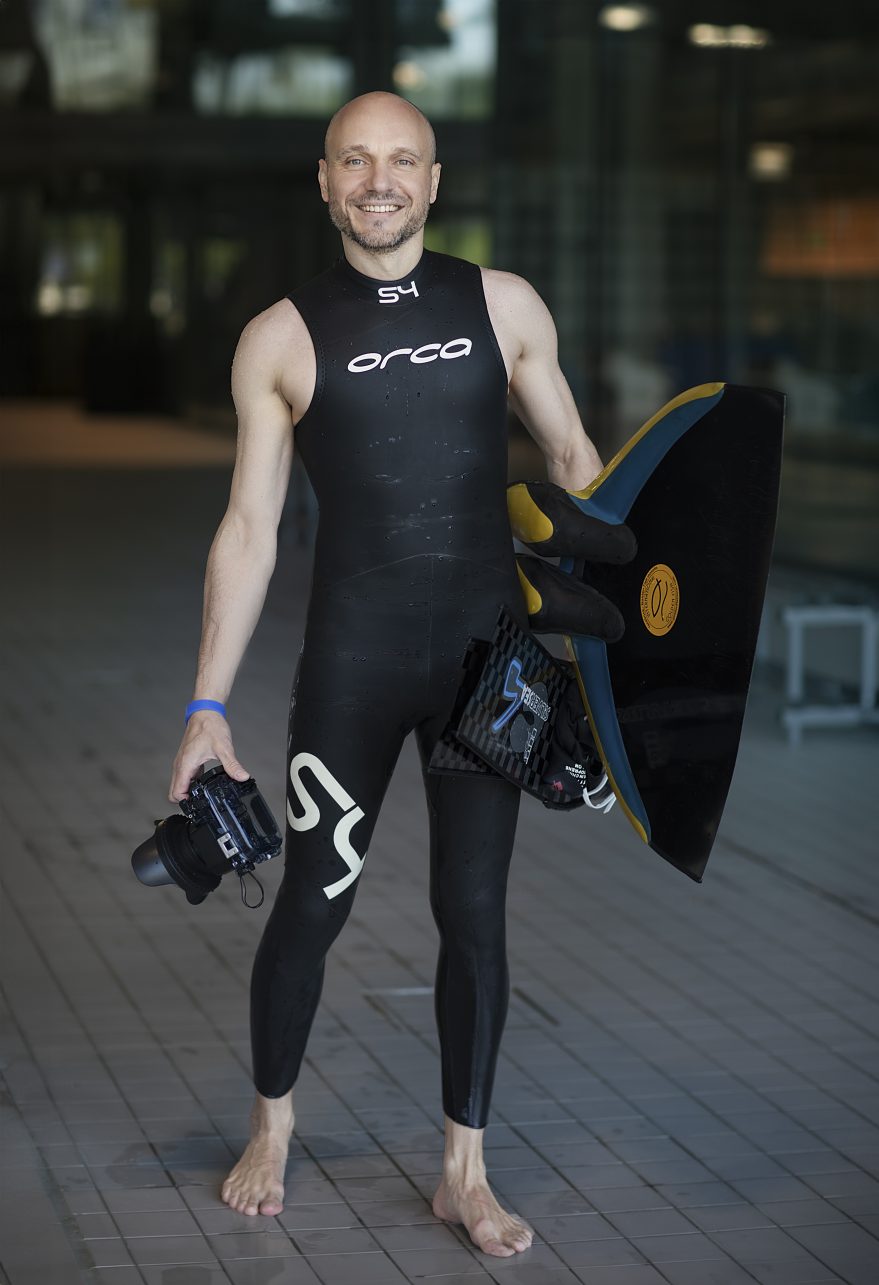
Interestingly, there is no upper age limit for those who want to start. You’re 60? Welcome! Which organ is the most important to train, I wonder. Maybe the brain? It turns out that it would be best to leave your head at home. After all, the brain consumes about 20-30 percent. of oxygen entering the body, controlling not only the flow of thoughts but also other processes. I asked the interviewee to describe in detail what happens when a person is diving.
So, we dive head down. The pressure increases and we start to feel it on our eardrums. The pressure needs to be compensated, i.e., created inside the body for the eardrums to recover. Much like when flying on an airplane, when your ears are blocked. In such cases, some people like to chew gum, while others like to blow it away. Things are similar when diving, only we are upside down. And here we pay attention to our soft palate. It’s a muscle that many of us don’t know how to regulate and don’t usually move because we walk on our feet or lie horizontally. When we get into an upside-down position, the palate collapses and closes certain channels and we can no longer blow to unclog the ears. So, you need to train to find the ability to control that muscle and not let it fall. Some succeed extremely quickly, almost automatically, but most have to practice, pump air with a canister, “And then everything becomes easy.”
When people hear the word freediving, they think it’s an extreme, adrenaline-filled sport, but it’s actually quite the opposite. “The most important competition is with yourself,” Elvinas reveals. According to him, as in any other sport, only a small percentage of athletes participate in sports tournaments. Most of them dive shallow, up to 20-30 meters. The ability to inhale and relax perfected during training is also necessary to achieve results.

During competitions, you will not notice people competing. The members of the community support each other in such a way that looking from the sidelines, you won’t be able to distinguish between athletes and fans. People smile and hug. “There’s more internal fear of how things will go, and that fear breeds empathy and support for the other. Of course, every community has those who are born to compete, whose only goal is to win and get a prize.” Okay, but what do divers do during competitions held in pools?
“There are two directions in freediving: the pool and the depth. There are dynamic and static states in the pool. The static one is when you inhale, lie face down in the water, and don’t move. It is about who stays in the water the longest.
The dynamic state is diving horizontally for distance without fins (Dynamic No-Fins) or with fins (Dynamic with fins). It is measured how many meters you can swim underwater, that is, you can move back and forth in the pool. And then there’s depth. We say that the swimming pool is sports and depth is real freediving when there’s free fall and pressure,” Elvinas explains.
Lithuanians engaged in freediving include singers and actors, conductors, doctors, officers, businessmen, and people of other down-to-earth and unearthly professions. Elvinas, for example, is an urban beekeeper (we wrote about his boss Paulius, and Urbanbee in the October 2023 issue of Kaunas Full of Culture). Water attracts and unites everyone because of its calming effect. About a quarter of people come to freediving courses to overcome their fear of water. For example, such a technical, step-by-step introduction makes life much easier for people who experienced drowning. Such courses can also be useful for those engaged in water sports: wakeboarders or surfers. When you make peace with yourself, you also develop respect for what you meet underwater, for the sea and the ocean in general. Although, when you dive deep, there is really no time to look at the underwater flora.
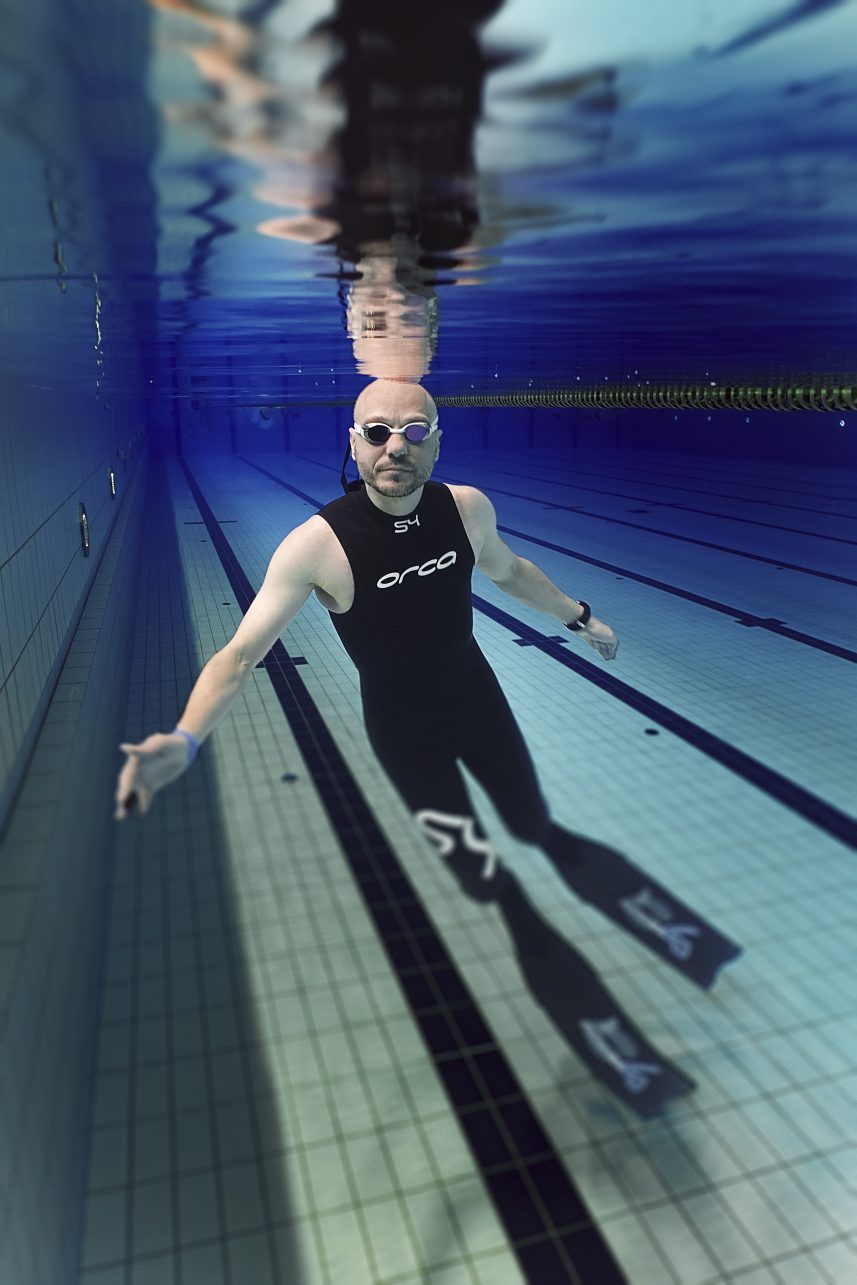
“We look inward: what do I feel, how do I feel? Am I okay? Is the depth letting me in? Does my body allow it today? Water helps you return to your body. People find a connection with themselves when they get underwater, which is quite difficult on land. More precisely, it’s easy to lose that connection,” Elvinas explains. He says it’s really easy to get hooked once you try, and it’s not expensive regarding required inventory. Thus, diving becomes almost a mandatory attribute of free time. After all, people often plan their vacations by the water, so while one part of the family is sunbathing, the other can dive. Here we speak from experience: Elvinas’ wife, who is not actively engaged in sports, much prefers this passion of his to skiing, for example.
It is difficult to practice deep diving in Lithuania. There is no infrastructure, heat, and… the depth itself, of which, these days one needs a lot. Athletes dive with a monofin, along a rope, without the fin but holding onto the rope – they pull themselves up – or without the fin and the rope or any help. “This is the truest and most complicated technique.” The rope is important because in great depths body turns to stone and is pulled down, so to swim back up, you need to do it as vertically as possible. The rope helps you orient yourself and saves precious time. In addition, if you feel that something has happened, you use the rope to rescue yourself. If that sounds tempting, you should know that there is a freediving center in Dahab, Egypt, founded by Lithuanian Mindaugas Kreivėnas.
Although we have just discussed the advantages of warmer climates, at the end of our conversation Elvinas told me about a mind-opening experience that happened to him in Lake Galvė. “It was summer, 25 degrees outside but at the depth of 20 meters, it was only four degrees. I hug the rope and let myself be. After a while, the discomfort of not breathing disappears, and I relax and feel myself. I feel good in an unfriendly environment – in the cold, the dark, from which you still have to scramble to get out. I capture the moment and bring it with me to the surface, to life. I can come back to this moment in any uncomfortable situation and remember that I can feel good no matter what.” This skill is a secret that leaves you wanting more.
The relaxation phase is the most important, without it there will be no results either in the pool or in great depths. You have to stop thinking, scan your body, let go of work, home, environment, and worries, breathe in, and dive. “This ability is learned, and that’s what drives you the most,” Elvinas claims, comparing it to yoga or spiritual practice.
If you visit the Žalgirio Arena Swimming Pool on June 21-29, you will feel like you are in the world relaxation championship with more than 150 athletes from more than 30 countries and 5 continents. “Before the start, everyone here will be lying in Shavasana, some with headphones, others already in space,” one of the organizers of the tournament says half-jokingly, half-seriously. Such preparation while lying down lasts until the start. One can lie down for as long as an hour, and after the start is announced, the athlete has 2 minutes to start the dive.
Of course, watching such a sport is quite difficult, although the World Championship in Kaunas will be open and free. “It looks like a picnic: we gather to support friends, acquaintances, and relatives, and we talk and hug,” Elvinas talks about the Lithuanian championships. At the World Championship in Kaunas, 6 athletes will compete at the same time, but you will not see much of them live when they dive. But there will be a drone and underwater cameras! It already seems like a contemporary theatre that cannot do without screens these days, but why not? Best wishes, Mantas, we will be rooting for you!
